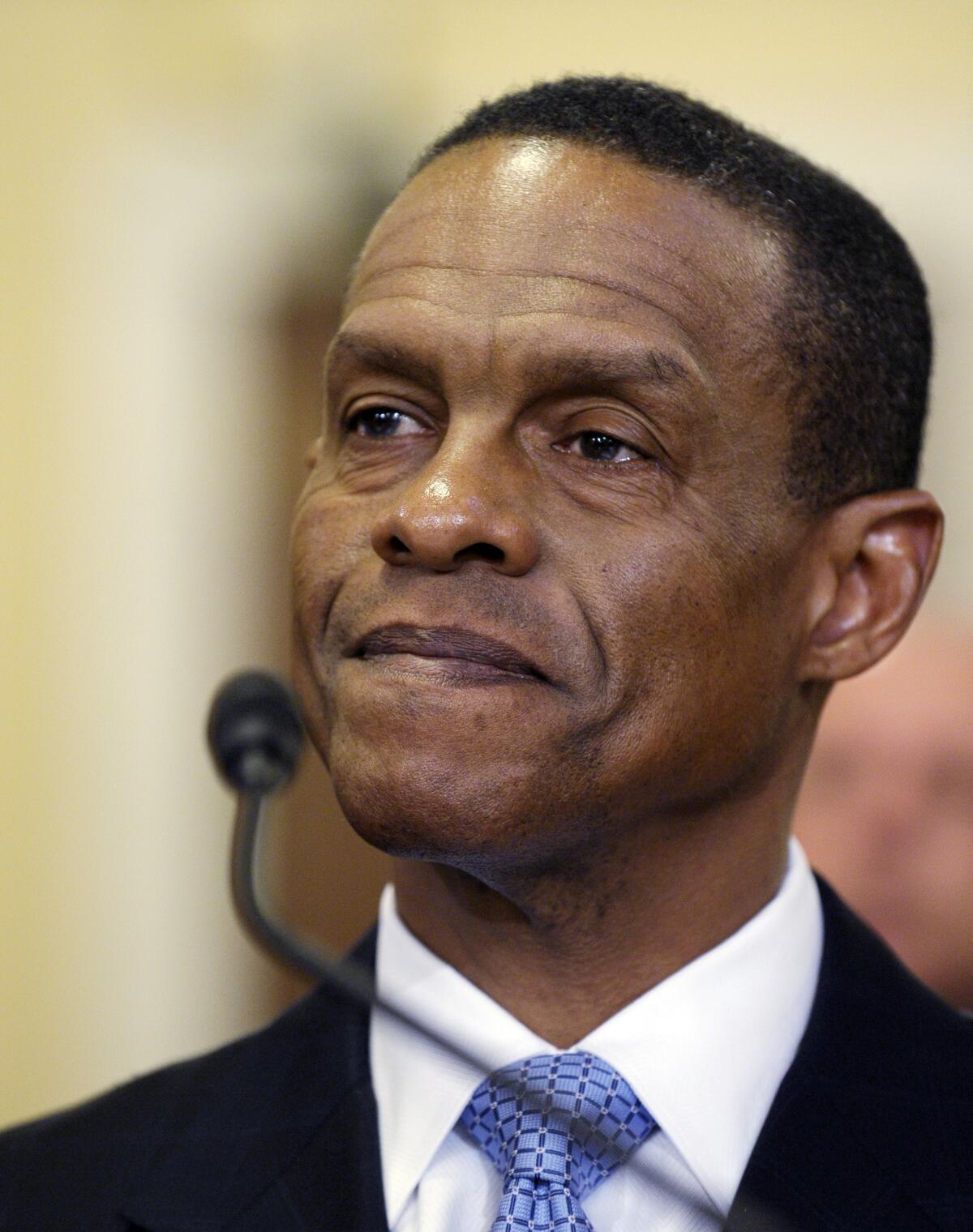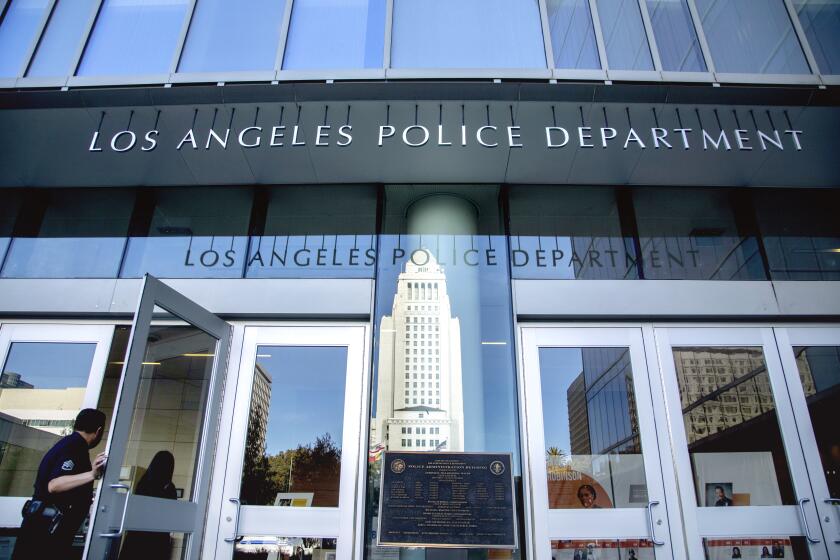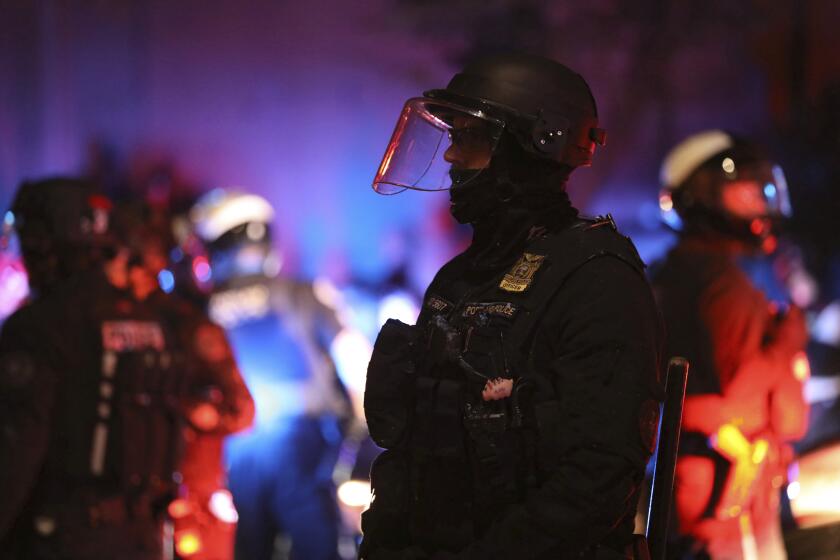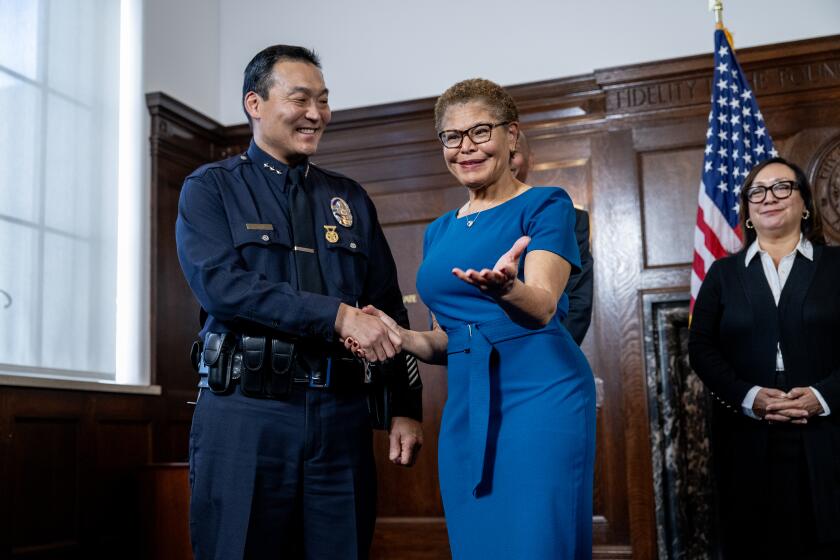How getting ‘jacked up’ by police helped shape the LAPD’s chief watchdog

- Share via
Since taking over as president of the Los Angeles Police Commission in August, Erroll Southers has drawn praise — and some criticism — for his stewardship of the civilian agency charged with oversight of the city’s Police Department.
A career law enforcement official and former FBI agent, Southers is now an associate senior vice president at USC, where he is responsible for three departments and 400 employees. He sat down with The Times in his office on the first floor of LAPD headquarters earlier this month to reflect on his first year with the Commission, former Chief Michel Moore’s legacy, officer recruitment and the need to explore alternatives to armed police for certain emergencies. The interview has been edited for length and clarity.
LAT: Now that you’ve kind of dipped your toes into the water and have some experience, what do you see your role as or the Commission’s role in general?
Southers: I’m only the second former police officer in the history of the commission, so I come to this with a very different lens. In fact, many of these folks in this building were my graduate students over the last 20 years. So with that, there’s a relationship. I’ve known and been around the LAPD for 44 years. But now I’ve got people upstairs that have been in my classroom [at USC]. And that’s a different relationship.
I think there’s a comfort level perhaps with me, more so than others because I, quite frankly, don’t need to go on a ride-along. They know that I’ve been in their shoes, radio calls, challenging times. When I was in the [FBI], SWAT, field training officer, gangs and all those other things, I’ve worked those details. When I sit in closed sessions on categorical uses of force, I can ask questions from a perspective of experience that perhaps my colleagues can’t.
Even in seemingly clear-cut cases of serious misconduct, the LAPD’s disciplinary system has led to outcomes in which those involved keep their jobs and continue collecting paychecks. Now, some leaders are renewing calls for a radical overhaul.
LAT: The commission has long held this policy-making role inside the department and a watchdog oversight sort of role, but has it evolved, and do you think that it needs to evolve?
Southers: I think it needs to evolve and I think we can be part of that evolution. I don’t know that we could prompt the evolution that’s necessary, with all due respect, without the George Floyd death happening. This, to me, stimulated some reform. The unfortunate thing is … we live in a zero-sum America. It’s unfortunate that ... you say “police reform,” and they hear “defund the police.” You say “DEI” [diversity, equity and inclusion] and someone hears, “white genocide.” That’s not what this is about, and that needs to change. And that’s just not about policing, that’s about America.
LAT: What do you see as the biggest issues, problems, concerns facing the department today?
Southers: Number one has to be — I would have to go along with the mayor — recruitment and retention.
We’re getting the interest. People still want to be with LAPD. And I’m going to be very candid with you: that room [at recruitment events] has its share of women, that room has its share of African Americans, Hispanics, Asians, young [people]; there are people there in their 50s, I mean, we’re having no problem getting people in the room. It’s the standard that we’re maintaining. And I say this to push back on the folks out there who believe that we’ve compromised in some way: No, we haven’t. That’s the reason we only get five to 10 out of 100.
So that would be my number one item, would be recruitment and retention. The other is, I’m always going to say community engagement and community building. We need to do a better job. We need to improve our image.
LAPD inspector general Mark Smith is a finalist for a job overseeing court-ordered reforms at the police department in Portland, Ore.
LAT: You’ve heard the criticism about the Police Commission being a lapdog or rubber-stamp body for the LAPD — what do you make of that? And how do you walk that fine line between working with the department to improve it where necessary, but also being responsive to community feedback or criticism?
Southers: That’s fair. I’m one of those people that’s trying to walk the walk on educating people. I have shared, to the extent that I can without compromising personnel issues, that every categorical use of force that we adjudicate every Tuesday is examined to the level of a homicide. We have officers’ statements, suspect statements, witness statements, body-worn video, dashcam video, any buildings in the area — whether they’re residences’ or businesses’ video — we look at drawings. We have videos slowed down, which is a criticism from our officers sometimes, because we’re looking at incidents slowed down, where they don’t get to slow down. All that to say with all that information, when we come back and say [a shooting is] in policy we can say without any reservation, it’s in policy.
I’m in this position now because I grew up … getting stopped by the police for nothing other than walking down the street. And I’m not the stereotype. With all due respect, I had some great parents — I wouldn’t be where I am right now if it wasn’t for them — both educated. Me and my brother went to Ivy League schools and came out with no debt because my parents did the right thing. They knew what they were doing. Nobody in my family has ever been in jail. None of my friends, who were all black, nobody in their families, ever been in jail. All my friends’ parents were married. So I killed that stereotype that people have out there about us.
But I say all that to say I still got jacked up. And then finally after it happened enough, I was complaining to my dad one day, and he said, ‘Well, you can’t change the castle from outside the moat.’ So here I am. I feel like now I’m inside the castle. Now I can affect policy. Now I can affect officers. Now I can say, ‘You know that officer definitely shouldn’t be here.’
I started a registry at USC. It was originally called the LEWIS Registry and now it’s called the Police Misconduct Registry, where we started documenting officers who have been fired across the country, because my opinion is once they’ve been fired — and you know what it takes to fire an officer — they shouldn’t get hired by someone else. I feel that, felt that way then, I feel that way now. So when I hear the criticisms from people out there — who think I don’t know, all of a sudden I’m not Black — I just take it and move on. If they only knew how much we care and how much we can affect what’s happening here. I think they probably say it anyway because they have to.
Los Angeles officials have hired a Northern California-based headhunting firm to identify and vet candidates to be the next chief of police.
LAT: Obviously one of the most monumental tasks before you right now is the search for a new chief. Can you talk about where you see it going? How has the job of chief of police of LAPD changed?
Southers: I can say without any reservation: I’m part of a group of people that this is going to be the most important professional decision I’m gonna make in my life. We’re gonna select the chief of police for the Los Angeles Police Department. And for at least a five-year period, that’s going affect 3.8 million people for part of a generation. So I and my fellow commissioners take that very seriously.
I’ll say the same thing that I’ve said [to] people who’ve asked me so far: [we’re searching for] nothing short of the best person in this country. And if that person’s in this building, that’ll play out. I did the same thing for a search a little over a year ago at USC; I think when I brought [Department of Public Safety Chief] Lauretta Hill to USC, I think I got the best person in America; brought her from Dallas.
LAT: When you consider Chief Michel Moore’s tenure or his legacy, where do you think he’s going to fit into the pantheon of LAPD chiefs?
Southers: There were a couple of chiefs throughout the years that you’re always going to remember for something. Daryl Gates will always be remembered for, if nothing else, LAPD invented SWAT when he was here. That’s a biggie. I mean there’s a number of things he did, but that’s a biggie.
When Bratton came in, the consent decree that changed the department … Bratton changed the department. I think Chief Moore is gonna be remembered in the same sentence with Gates and Bratton, because he had two monumental shifts — most chiefs will never have any — but he had two. He had the death of George Floyd, which in my opinion changed policing across this country, and he had a pandemic. And those factors alone, to still be standing when it’s done; regardless of what people say — about what he should do, what he didn’t do, about how he did it — he was still standing.
More to Read
Sign up for Essential California
The most important California stories and recommendations in your inbox every morning.
You may occasionally receive promotional content from the Los Angeles Times.














